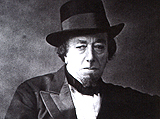The Earl of Derby 1852, 1858-9 and 1866-8, Conservative
 Born: 29 March 1799 at Knowsley Hall, Prescot, Lancashire
Born: 29 March 1799 at Knowsley Hall, Prescot, Lancashire
First entered Parliament: 30 July 1822
Age he became PM: 52 years, 331 days; 58 years, 328 days and 67 years, 91 days
Maiden speech: 30 March 1824 on the Manchester Gas Light Bill
Total time as PM: Three years, 280 days
Died: 23 October 1869 at Knowsley Hall, Prescot, Lancashire
Facts and figures
Nicknames: "Scorpion Stanley" and "The Rupert of Debate"
Education: Eton and Christ Church, Oxford
Family: Derby was the eldest son and the first of seven children. He was married to Emma Caroline Bootle-Wilbranham, and had two sons and one daughter
Interests: Classics (he translated the Iliad into blank verse), sport, gambling
Biography
Both a Whig and a Tory
The Earl of Derby was unusual for serving in both Whig and Tory administrations.
Heir to an aristocratic family, the Earl of Derby followed the traditional route into politics.
He began his career a Whig, becoming Member of Parliament first for Stockbridge and then for Preston. He was appointed Chief Secretary for Ireland in Lord Grey's administration, bringing in the Irish Education Act in 1831.
In 1833 he became Colonial Secretary under Grey, introducing measures for the emancipation of slaves in the British Empire. He resigned over proposals to appropriate surplus revenues from the Irish Church.
Having argued with members of the Whig party, gradually Derby grew closer to Robert Peel, and in 1837 he joined the Tory party. In 1841 he was appointed Secretary of State for War and the Colonies in Peel's second administration.
Opium Wars
During his time in the post Derby had responsibility for issues such as the 'Opium Wars' with China.
But Derby resigned from Peel's government when he disagreed with Peel over repealing the Corn Laws. He became a focus for the protectionists in government.
In February 1852, Derby became the PM himself. Peel's supporters refused to back him, forcing Derby to form his Cabinet with loyal but inexperienced Conservatives.
The ministry became known as the 'Who? Who? Cabinet'.
 By the end of the year his government had collapsed, when Chancellor Disraeli's Budget was defeated.
By the end of the year his government had collapsed, when Chancellor Disraeli's Budget was defeated.
Derby's second administration, 1858-59, achieved more, although it was still dependent on divisions among the opposition for survival. One action was the
India Bill of 1858, which transferred control of the East India Company to the Crown. Around the same time, the Jews Relief Act ended the disability of Jews from sitting in Parliament.
But in 1859 Derby's attempt to widen the franchise led to his government's downfall. Derby returned to government as PM for a third time in 1866. His final government was responsible for the landmark Second Reform Bill of 1867, a milestone in the democratisation of Britain.
Ill health forced Derby's resignation the following year, and led to his death in 1869.
There is a monument to him in London's Parliament Square. His last words, when asked how he was, were 'bored to utter extinction'.
Quote unquote
In his last speech to the House of Lords: "My Lords, I am now an old man, and like many of your lordships, I have already passed the three score years and ten. My official life is entirely closed; my political life is nearly so; and, in the course of nature, my natural life cannot now be long."
Did you know?
Derby is considered to be the father of the modern Conservative Party. His tenure as leader of the party lasted for 22 years - to date the all-time record for the party.
Wife
Emma Wilbranham was Derby's closest confidante and friends and acted as her personal secretary. She hosted many political parties for him which were described as being as 'dull and depressing as a London fog'.

 PM's Biography
PM's Biography PM Record Breakers
PM Record Breakers Take a tour of Number 10
Take a tour of Number 10 Useful Links
Useful Links